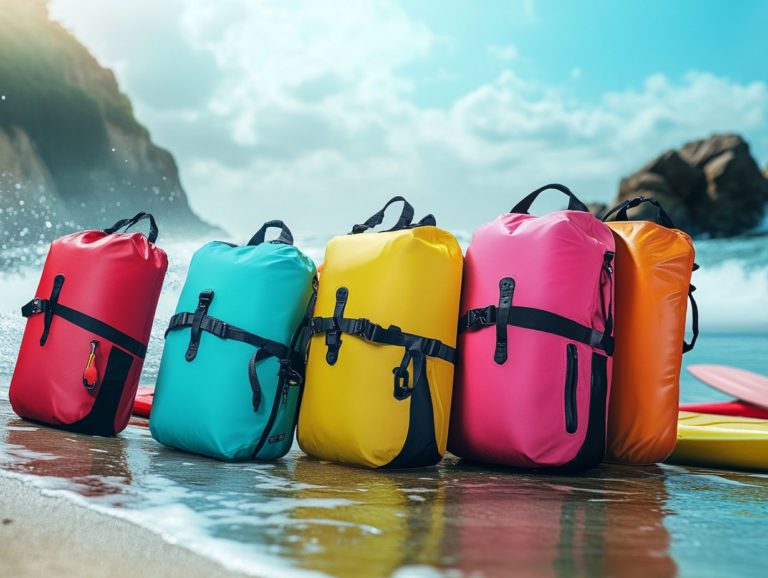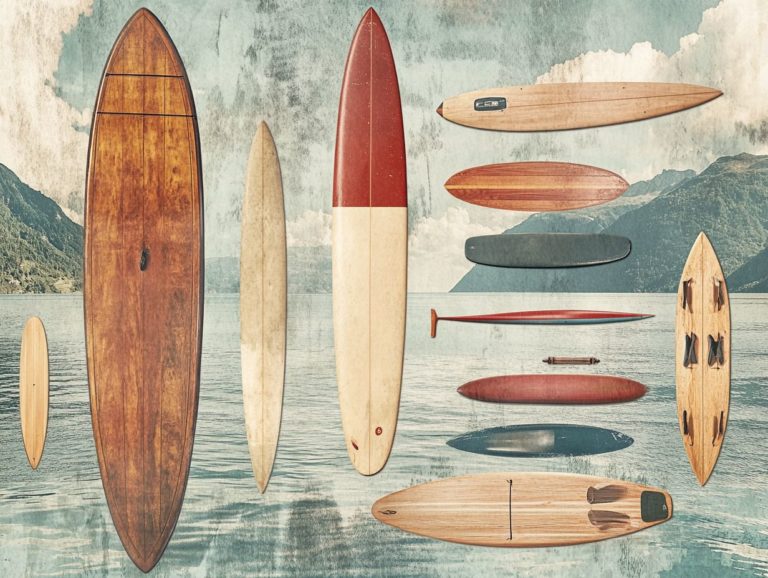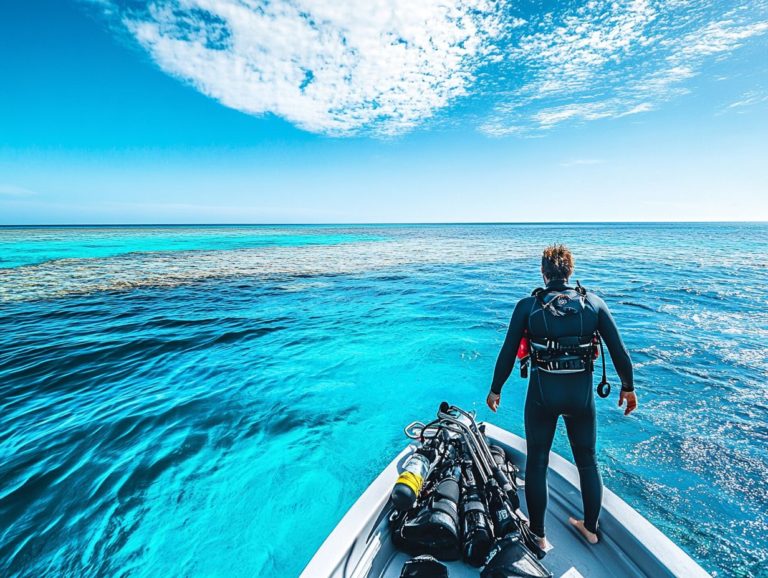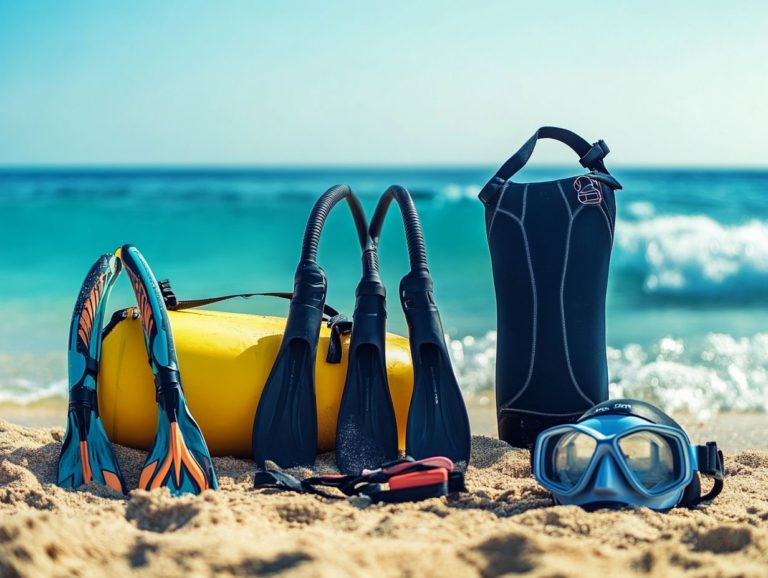What to Know About Water Sports Etiquette
When you re diving into the world of water sports, understanding the rules of etiquette is just as vital as perfecting your techniques.
Good etiquette ensures a safe and enjoyable experience for everyone involved, whether you re swimming, boating, or surfing. This article delves into the significance of water sports etiquette, offering general guidelines and tailored tips for various activities.
It also covers effective communication methods and how to show respect toward your fellow enthusiasts, alongside strategies for addressing any etiquette breaches that may arise.
Dive in and elevate your water adventures now!
Contents
- Key Takeaways:
- The Importance of Water Sports Etiquette
- General Rules and Guidelines
- Specific Etiquette for Different Water Sports
- Tips for Practicing Good Water Sports Etiquette
- Dealing with Etiquette Violations
- Frequently Asked Questions
- What to Know About Water Sports Etiquette
- What are some general rules for water sports etiquette?
- How should I behave around other water users?
- What should I do if I see someone in distress?
- Are there any specific rules for specific water sports?
- What should I do with my trash while participating in water sports?
Key Takeaways:
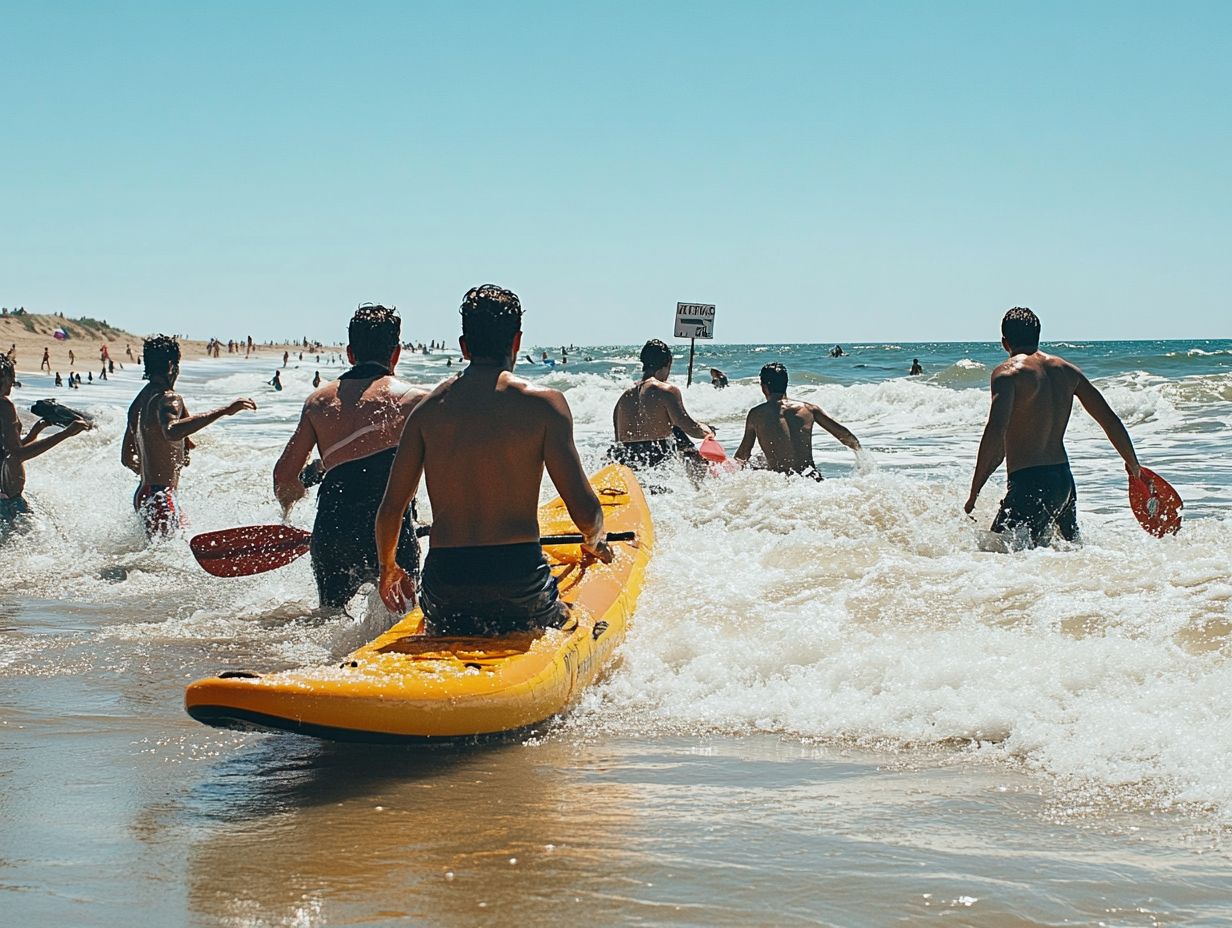
- Respect and communication are key in practicing good water sports etiquette.
- Different water sports have specific rules and guidelines that should be followed to ensure safety and enjoyment for all.
- Addressing and preventing etiquette violations is important for maintaining a positive reputation and safe environment for all water sports enthusiasts.
The Importance of Water Sports Etiquette
Understanding the significance of water sports etiquette is essential for both your safety and enjoyment, as it lays the groundwork for responsible behavior on the water.
By practicing proper etiquette, you can fully engage in activities such as swimming, boating, and kayaking while showing respect for marine life and aquatic ecosystems, thereby mitigating environmental impact.
Following established guidelines not only helps prevent accidents but also ensures legal compliance, enhancing the overall experience for everyone involved.
This harmonious interaction contributes to a positive reputation for the community and encourages responsible participation in water sports.
Why Etiquette Matters in Water Sports
Etiquette in water sports is crucial for ensuring that you and your fellow participants can enjoy your activities safely and respectfully.
When you understand and practice proper etiquette, you significantly lower the chances of accidents or conflicts on the water. This awareness enables both swimmers and boaters, allowing you to navigate your surroundings with confidence while fostering a culture of respect and cooperation.
For instance, adhering to basic swimming guidelines and grasping boating safety protocols can prevent injuries and misunderstandings.
Being legally compliant with equipment and safety measures not only protects you but also safeguards everyone else sharing the space.
Ultimately, following these conventions enriches your overall experience, cultivating a harmonious atmosphere and promoting enjoyment where everyone can appreciate nature without fear or tension.
General Rules and Guidelines
General rules and guidelines for water sports are designed to boost both safety and enjoyment, ensuring that you are fully aware of your responsibilities while navigating the water and following local regulations.
Basic Etiquette for All Water Sports
Adhering to basic etiquette in water sports is essential, and this includes following safety tips and practices, utilizing the buddy system a practice where two or more people ensure each other’s safety and being ready for emergencies.
These fundamental practices create a safe and enjoyable atmosphere for everyone involved. By prioritizing safety tips like donning life jackets and familiarizing yourself with the specific waters you can fully immerse yourself in your activities without courting unnecessary risks.
The buddy system enhances safety while fostering a strong sense of camaraderie among participants.
Being adequately prepared for emergencies such as knowing basic first aid or identifying the nearest rescue services can truly make a difference in critical situations. This underscores the importance of collective responsibility in the realm of water sports, ensuring that everyone enjoys their time on the water.
Join the movement of respectful water sports enthusiasts today! Share your experiences or tips regarding water sports etiquette.
Specific Etiquette for Different Water Sports
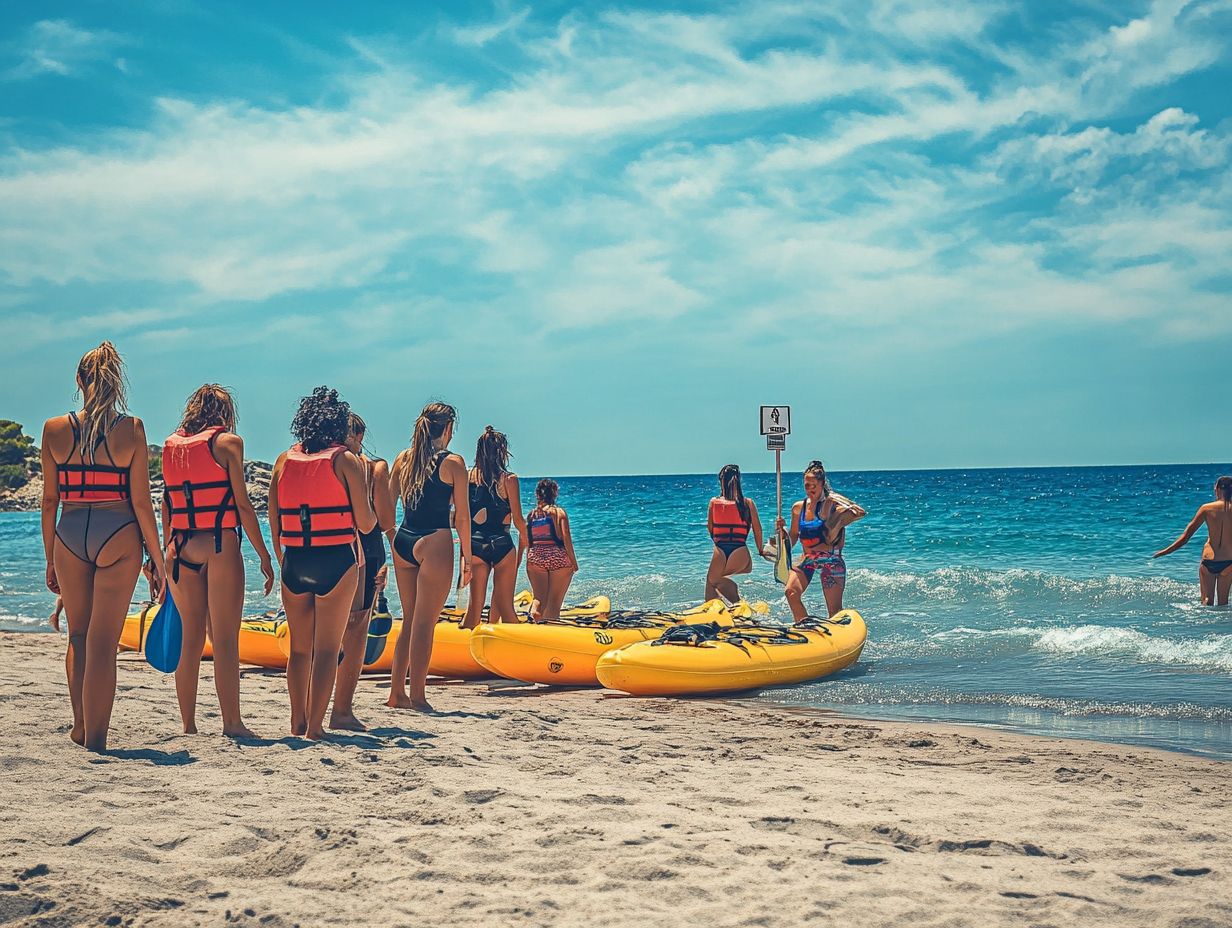
Engaging in various water sports calls for a distinct set of etiquette that prioritizes safety, enhances enjoyment, and fosters respect for both the environment and your fellow enthusiasts.
By adhering to these guidelines, you elevate your own experience and contribute to a more harmonious atmosphere on the water.
Etiquette for Swimming
When you re swimming, following water safety practices and local regulations is essential for ensuring a safe and enjoyable experience. Familiarize yourself with the specific rules of the area, such as designated swimming zones and hours of operation.
It s equally important to master the basics of swimming, including proper stroke techniques and flotation safety. Knowing these basics boosts your confidence and skills!
Being mindful of those around you is crucial. Recognizing personal space and avoiding erratic movements contribute to a more harmonious environment for everyone.
Whether you re sharing lanes at the pool or navigating crowded beach areas, demonstrating thoughtful swimming etiquette helps create a positive atmosphere that everyone can appreciate.
Etiquette for Boating
Boating etiquette is vital for ensuring your safety on the water. Start by wearing a life jacket and checking weather conditions before you set sail.
Being aware of your surroundings and respecting the rights of fellow boaters is part of the package. Check your safety equipment now like flares, fire extinguishers, and communication devices to ensure you re ready when hitting the water!
This sense of responsibility extends to minimizing your wake and steering clear of congested areas, allowing others to navigate safely.
Understanding rules for moving boats safely and local laws helps vessels communicate smoothly, fostering a respectful atmosphere on the water.
By adhering to these important guidelines, you contribute to a more enjoyable and secure experience for everyone out there.
Etiquette for Surfing
Surfing etiquette underscores the importance of respecting others in the water and embracing the buddy system to ensure everyone’s safety.
Grasping wave priority is essential for cultivating harmony among surfers. The surfer closest to the peak of the wave typically holds the right of way.
Following this principle enhances enjoyment for all and significantly reduces the risk of collisions. Always keep an eye on your fellow wave riders, signaling your intentions and maintaining a respectful distance.
Demonstrating good manners like waiting your turn and refraining from dropping in on someone else s wave shows respect for the shared ocean environment. Ultimately, this makes the experience much more fun for everyone!
Tips for Practicing Good Water Sports Etiquette
Practicing good water sports etiquette means embracing effective communication and showing respect for others. This approach enhances your experience and fosters a safer and more enjoyable environment for everyone involved.
Communication and Respect
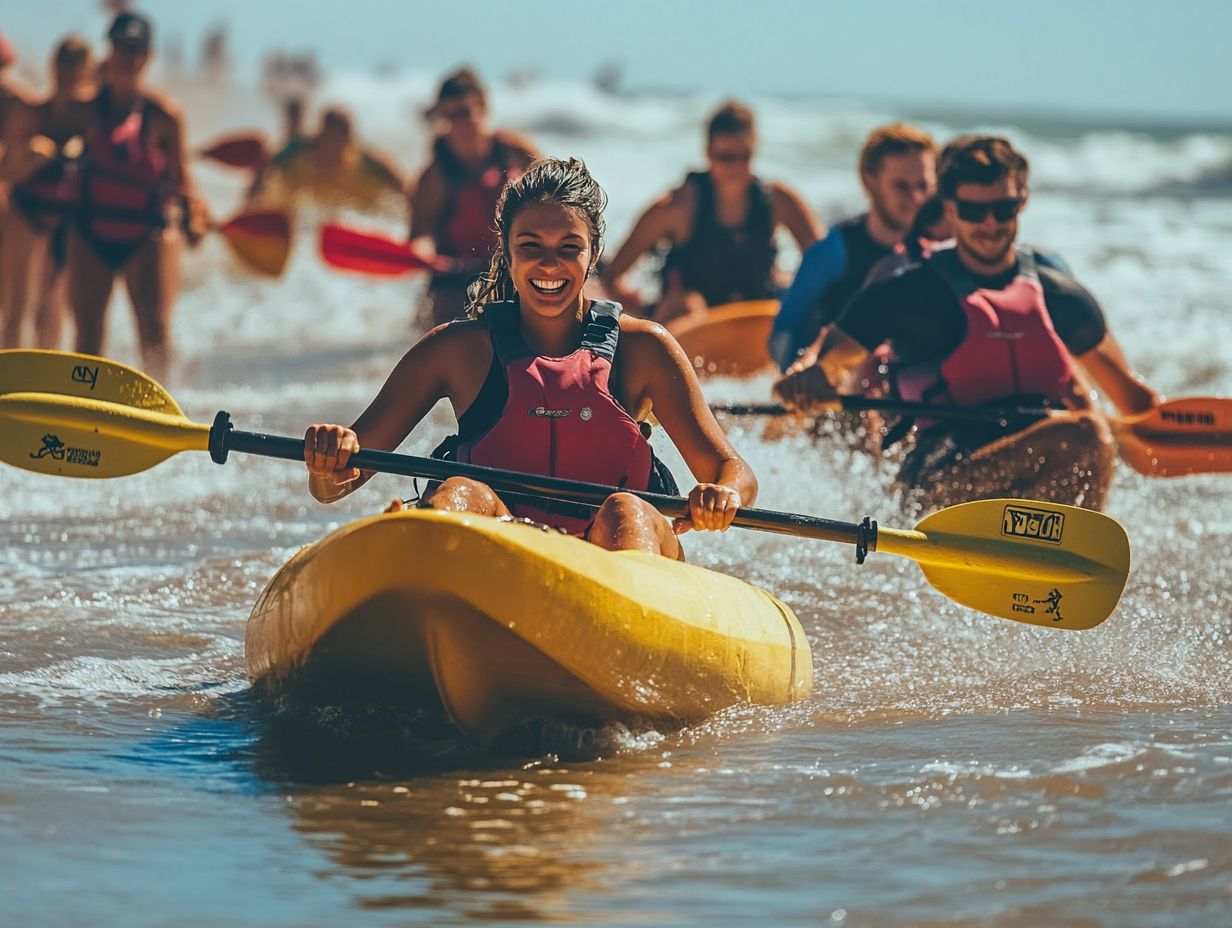
Effective communication and mutual respect serve as the cornerstone of practicing good etiquette in water sports. Actively engaging in open dialogue cultivates a sense of trust and enhances your awareness of others’ skills and limitations.
This becomes especially vital in activities like swimming, kayaking, or paddleboarding, where teamwork plays a critical role in ensuring safety.
The buddy system a fundamental aspect of water safety depends heavily on individuals clearly expressing their intentions and respecting each other s abilities.
By doing this, you help create an environment where everyone feels valued and understood, ultimately minimizing risks and preventing accidents while promoting a more enjoyable experience in water activities.
Being Mindful of Others
Being mindful of others while enjoying water sports isn t just about avoiding accidents; it s about keeping everyone safe. This awareness creates a safer and more enjoyable environment where you and your fellow enthusiasts can fully embrace the thrill of the water.
Practices like maintaining a safe distance from others, checking in to ensure everyone feels comfortable, and clearly communicating your intentions can significantly enhance the shared experience. Equip yourself with the proper water sports safety gear and familiarize yourself with emergency protocols, which are the steps to follow in a crisis. Knowing how to react in an emergency can make all the difference. Fostering a culture of preparedness among your peers promotes collective safety on the water.
Dealing with Etiquette Violations
Navigating etiquette violations in water sports is essential for preserving safety and ensuring everyone s legal compliance, thereby enhancing the enjoyment for all participants.
How to Handle and Prevent Incidents
Handling and preventing incidents in water sports demands a proactive mindset, one that prioritizes emergency preparedness and emphasizes essential safety tips for water sports.
By concentrating on meticulous planning and heightened awareness, you can significantly reduce the risks associated with activities like kayaking, jet skiing, or diving. Familiarizing yourself with local conditions such as tides and weather patterns is crucial, as these elements can greatly impact your safety. Make sure you have the right safety gear ready to go, including life jackets, signaling devices, and first aid kits, to prepare for any unforeseen challenges.
Education is vital; attending safety courses can arm you with essential skills and cultivate vigilant practices that enhance the overall enjoyment of water sports.
Frequently Asked Questions
What to Know About Water Sports Etiquette
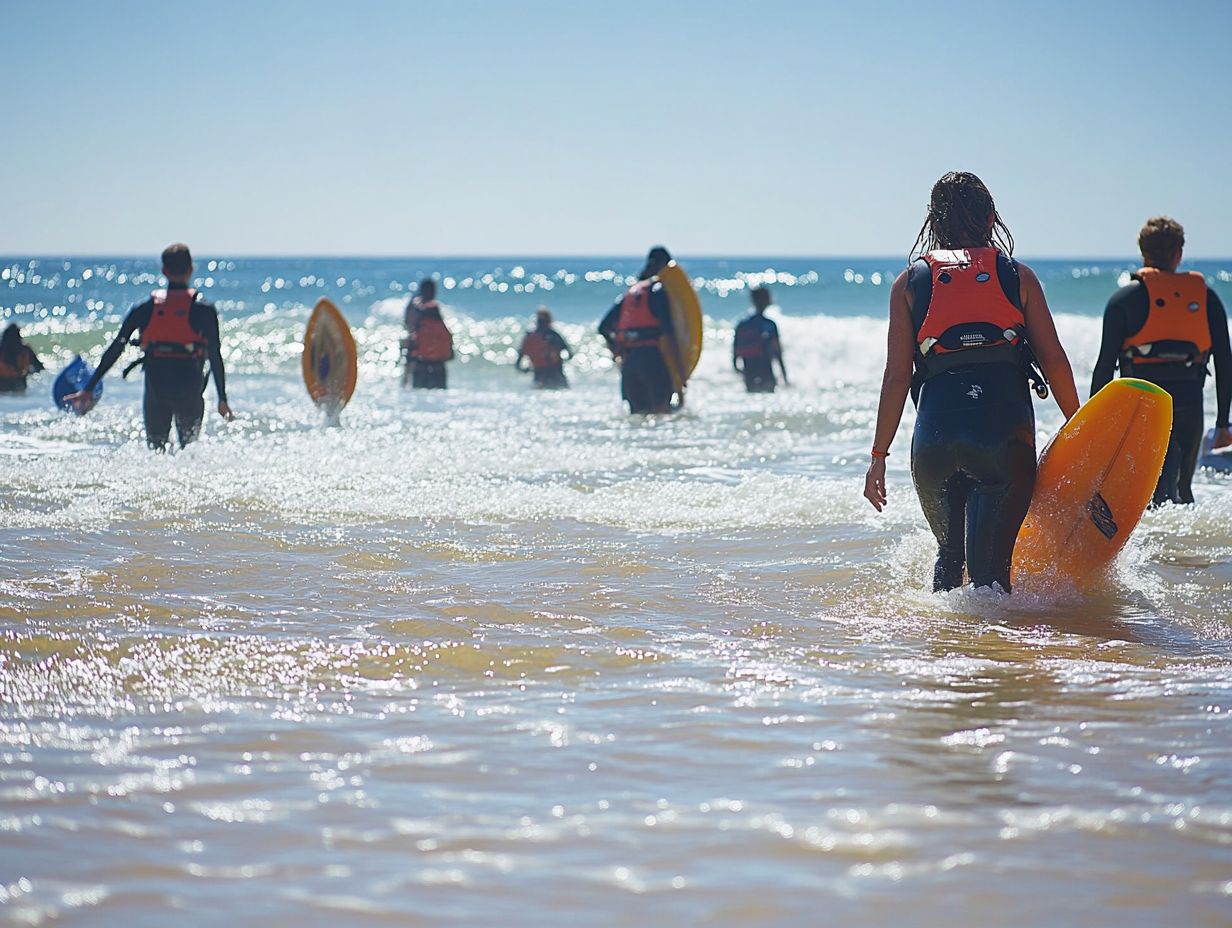
Water sports, like any other activity, have their own set of etiquette rules that should be followed to ensure a safe and enjoyable experience for all. Here are some common questions about water sports etiquette.
What are some general rules for water sports etiquette?
- Respect other water users.
- Follow designated routes and speed limits.
- Keep noise levels to a minimum.
- Be aware of your surroundings and follow any specific rules set by the location.
How should I behave around other water users?
Be mindful of others and always give them plenty of space. Avoid cutting off other boats or jet skis, and be aware of smaller watercraft, such as kayaks and paddleboards. When passing by others, slow down and give them a wide berth.
What should I do if I see someone in distress?
If you see someone in trouble, act immediately! Offer assistance if you can do so safely. If not, alert the proper authorities right away. Always prioritize safety and helping others in need. Know your limits and ensure you can assist without jeopardizing your own safety.
Are there any specific rules for specific water sports?
Yes, each water sport may have its own set of etiquette rules. For example, in surfing, the person closest to the peak has the right of way, while in wakeboarding, the boat should always turn in the same direction as the rider. It’s important to research and understand the rules specific to the water sport you are participating in.
What should I do with my trash while participating in water sports?
Always properly dispose of your trash and avoid littering in the water. If you are on a boat, secure any loose items to prevent them from falling into the water. Respect the environment and leave it better than you found it.

